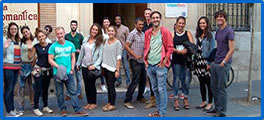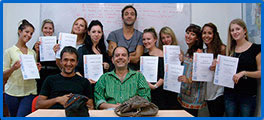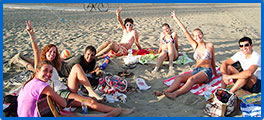
Spanish Courses in Málaga. LinguaSpain.
Course 20
It is the standard course. It consists of four daily lessons with 20 lessons per week.
Intended for a complete Spanish learning, it contains all the Spanish issues and the skills of the Common European Framework of Reference at every level, from absolute beginners to very advanced students.
Course 25
Course 30
Course 20+5
Course 20+10
Private Courses
D.E.L.E. Tests Preparation Courses
Specialized Courses
We describe here our most popular specialized courses. If you want to take a specialized course not described here, contact us.
- Legal Spanish
- Spanish for Business
- Spanish for Tourism
- Spanish and Literature
- Spanish for Teachers
Groups Program
Our group programs are aimed at schools, universities or any other group wishing to make a Spanish course in Malaga and hire previously a specific program.
More information on the Programs Group.
If you have any doubt about our courses, we are at your disposal to assist you without obligation.
Our educational method is active from the first day. Our students are going to implement the knowledge they have acquired in their classroom. This is why we make special emphasis on oral interaction.
Prior to the beginning of the course, the student takes a level test in order to enter the group that fits their Spanish level, with a continuous assessment of their progress.
This assessment is possible because of the small number of students per group that let the teacher keep an individualized tracking of all the student’s skills and abilities, to assess the progress made by each student and know which are their strong points or those in which they may need extra support.
The educational staff meets daily, in order to observe the evolution of the different groups and each of the students in them.
The Spanish teaching in our school fits the standards established by the European Council on the Common European Framework of Reference for Languages, working on the various competences established by this standard (Listening and Reading Comprehension, Oral Interaction and Expression and Writing Expression).
Therefore, the courses cover all the necessary aspects to learn Spanish. In general, the daily teaching involves two large blocks: the first one is devoted to grammatical theory, its practice and the oral and writing comprehension; and the second one focuses on the vocabulary and oral interaction and expression. For us it is fundamental to work on the conversation part because we think this is the best way to establish the knowledge acquired in the other competences.
We should not forget the cultural immersion, necessary to complete your Spanish training. For this purpose, we organize a variety of activities directed to the knowledge and approach to Spanish culture, especially in Andalucia.
The teaching materials are formed by selected methods approved by the Cervantes Institute, completed with materials elaborated by the teaching staff.
- Every course includes a weekly tutoring group class, for those students wishing to attend and review the most posed issues during the week.
- At the beginning of each course, the student takes a level test to determine which group they will be part of..
- At the end of the course, the student receives a course certificate, stating its duration and achievement dates, the total number of lessons taken and their level. If the student wishes to, they will be able to take a test at the end of their course and obtain a skill certificate.
- The course start dates are every Monday.
- Each class or lesson lasts 45 minutes.
- The maximum number of students per group is 8.
- Should two public holidays coincide on the same week, one of them will be a school day.
- As a rule, classes will take place in the morning. Taking as reference the Course 20 or standard, the lessons will begin at 10:00 am and end at 13:30 pm, with a 30-minute break between 11:30 am and 12:00 pm. For those courses with additional classes (Course 25, Course 30, Course 20 + 5, Course 20 + 10 and some of the specialized courses), the classes will take place before or after the standard courses, according to the student’s preferences and the school availability.
In high season, if there are no available hours in the morning because of the number of students, it may be possible to establish an afternoon programme.
Enero / January / Januar: 1
Febrero / February / Februar: 28
Marzo, March, März: 28, 29
Abril, April, April: -
Mayo, May, Mai: 1
Junio, Jun, Juni: -
Julio, July, Juli: -
Agosto, August, August: 15, 19
Septiembre,September, September: 9
Octubre, October, Oktober: -
Noviembre,November, November: 1
Diciembre,
December, Dezember: 6, 9, 25
Vacaciones Navidad:
de 20 diciembre a 7 de enero.
Christmas Holidays:
from December 20th to January 7th.
Weihnachtsferien:
Dezember 20 - Januar 7.
The highly qualified Teaching Staff has broad knowledge and skills in teaching Spanish as a foreign language, as well as years of experience in different Spanish institutes. Your teachers will make learning Spanish an enjoyable experience, with clear explanations of grammar contents and intensive practices of the acquired knowledge. Nevertheless, they will also offer you many different activities during the course, both inside and outside the classroom, in order to intensify your language working: from games or excursions to the city to short film video productions or cooking classes.
We have also teamed up for a very long time, and because of that, we have reached several goals:
- A modern and active common teaching method, which we have developed in accordance with the interests of the students who have learned with our teachers over the years.
- All the teachers, coordinated by the studies director, keep a continuous monitoring on the different groups and all students in order to know each student’s progress and ensure that they are always integrated into the most suitable group and level for their knowledge and improvement.
- A wonderful personalized atmosphere, in which we try to integrate the students.
Both the studies director and the teachers are at the students’ disposal to resolve all their questions.
The teaching programme for our school is adapted to the levels of the Common European Framework of Reference, set up by the Council of Europe, and in compliance with the development and criteria established by the Instituto Cervantes and the Association of Language Testers in Europe (ALTE).
In the following table you can see what these levels are and their name, as well as how they correspond to the official DELE titles (Diplomas in Spanish as a Foreign Language) as awarded by the Instituto Cervantes:
| Level | Name | ELE Diplomas |
| A1 | Breakthrough | |
| A2 | Waystage | |
| B1 | Threshold | DELE first level |
| B2 | Vantage | DELE intermediate level |
| C1 | Effective Operational Proficiency | |
| C2 | Mastery | DELE higher level |
Obviously, as each of the levels is very broad, we have subdivided them so that each group is much better adapted to the students' knowledge. However, in order to facilitate your registration, on the registration form you will find the basic options for the levels and once you are in school you will to a test in order to determine your level more accurately.
To help you choose your level on your registration form, here we give you a series of indicators that will guide you. Obviously, your choice of level will only be a guide. In the following table we describe to you the final objectives of each level, using which you must mark the level you are at on the registration form, although you might not have completed all of its content.
| Level | Description |
| Beginner | You do not know any Spanish or you only know a few words but no structure. |
| A1 | Your knowledge of both grammar and vocabulary are basic and you can hold very simple conversations. You understand if you are spoken to very slowly. You speak in the present and you know a bit of future and you already have a little contact with the past. |
| A2 | You can express yourself not only in the present but also talk about your past experiences although you can make mistakes, and you also know the future. You can hold conversations about everyday situations. |
| B1 | You can speak fluently, spontaneously and confidently. You write well-constructed texts and you have a wide vocabulary. As well as other elements of Spanish grammar, you already know the fundamental structures of the subjunctive and you use its present. |
| B2 | Your participation in a conversation with natives is very fluent, although the subject matters dealt with may not be very familiar to you. Your vocabulary is very wide and you also know specialised terms. You are progressing in the study of more complex structures of the subjunctive and its different verb tenses. |
| C1 | You have no problems in communicating and understanding and you express yourself very fluently and spontaneously without effort, using Spanish idioms and expressions. You recognise more complex grammatical structures that present greater difficulties. |
| C2 | You can understand everything that you hear and speak in the different registers in Spanish, using turns of phrase, appreciating small nuances in meaning, including in complex situations and you take part in any conversation using idioms, set phrases and colloquial expressions. |
Our Spanish school in Málaga. Facilities, teachers...

Our large school is located in the same city centre and is equipped with different classrooms for classes and film showings, common areas, leisure areas, patios….
All-level Courses, D.E.L.E. and specialized tests.

You can learn Spanish with our courses suited to different levels. Get ready for the D.E.L.E. tests or take part in our specialized courses.




























 LinguaSpain International
LinguaSpain International LinguaSpain Spain
LinguaSpain Spain LinguaSpain United Kindom
LinguaSpain United Kindom LinguaSpain Germany
LinguaSpain Germany  LinguaSpain France
LinguaSpain France  LinguaSpain United States
LinguaSpain United States LinguaSpain Austria
LinguaSpain Austria LinguaSpain Poland
LinguaSpain Poland LinguaSpain Finland
LinguaSpain Finland LinguaSpain Russia
LinguaSpain Russia LinguaSpain Hungary
LinguaSpain Hungary LinguaSpain Romania
LinguaSpain Romania LinguaSpain Czech Republic
LinguaSpain Czech Republic LinguaSpain Belgium
LinguaSpain Belgium  LinguaSpain Danmark
LinguaSpain Danmark  LinguaSpain Slovakia
LinguaSpain Slovakia  LinguaSpain Italy
LinguaSpain Italy  LinguaSpain Sweden
LinguaSpain Sweden 